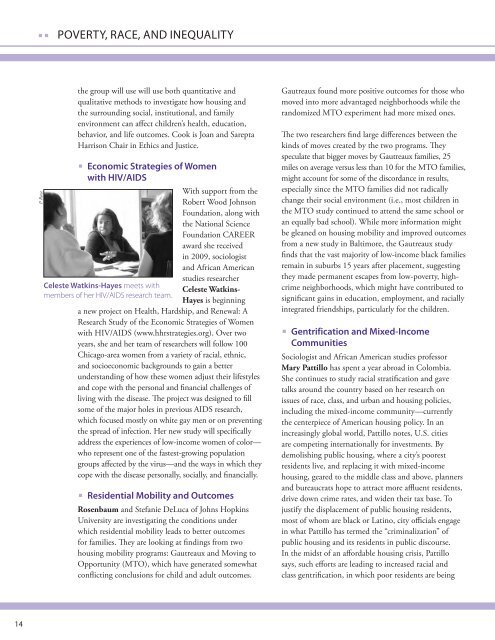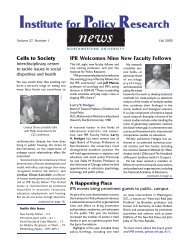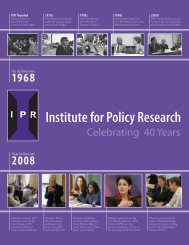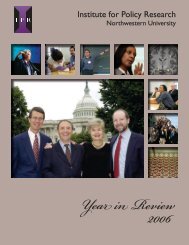Overview of Activities - Institute for Policy Research - Northwestern ...
Overview of Activities - Institute for Policy Research - Northwestern ...
Overview of Activities - Institute for Policy Research - Northwestern ...
Create successful ePaper yourself
Turn your PDF publications into a flip-book with our unique Google optimized e-Paper software.
POVERTY, RACE, AND INEQUALITY<br />
IPR 2009<br />
P. Reese<br />
the group will use will use both quantitative and<br />
qualitative methods to investigate how housing and<br />
the surrounding social, institutional, and family<br />
environment can affect children’s health, education,<br />
behavior, and life outcomes. Cook is Joan and Sarepta<br />
Harrison Chair in Ethics and Justice.<br />
< Economic Strategies <strong>of</strong> Women<br />
with HIV/AIDS<br />
With support from the<br />
Robert Wood Johnson<br />
Foundation, along with<br />
the National Science<br />
Foundation CAREER<br />
award she received<br />
in 2009, sociologist<br />
and African American<br />
studies researcher<br />
Celeste Watkins-Hayes meets with<br />
Celeste Watkinsmembers<br />
<strong>of</strong> her HIV/AIDS research team.<br />
Hayes is beginning<br />
a new project on Health, Hardship, and Renewal: A<br />
<strong>Research</strong> Study <strong>of</strong> the Economic Strategies <strong>of</strong> Women<br />
with HIV/AIDS (www.hhrstrategies.org). Over two<br />
years, she and her team <strong>of</strong> researchers will follow 100<br />
Chicago-area women from a variety <strong>of</strong> racial, ethnic,<br />
and socioeconomic backgrounds to gain a better<br />
understanding <strong>of</strong> how these women adjust their lifestyles<br />
and cope with the personal and financial challenges <strong>of</strong><br />
living with the disease. The project was designed to fill<br />
some <strong>of</strong> the major holes in previous AIDS research,<br />
which focused mostly on white gay men or on preventing<br />
the spread <strong>of</strong> infection. Her new study will specifically<br />
address the experiences <strong>of</strong> low-income women <strong>of</strong> color—<br />
who represent one <strong>of</strong> the fastest-growing population<br />
groups affected by the virus—and the ways in which they<br />
cope with the disease personally, socially, and financially.<br />
< Residential Mobility and Outcomes<br />
Rosenbaum and Stefanie DeLuca <strong>of</strong> Johns Hopkins<br />
University are investigating the conditions under<br />
which residential mobility leads to better outcomes<br />
<strong>for</strong> families. They are looking at findings from two<br />
housing mobility programs: Gautreaux and Moving to<br />
Opportunity (MTO), which have generated somewhat<br />
conflicting conclusions <strong>for</strong> child and adult outcomes.<br />
Gautreaux found more positive outcomes <strong>for</strong> those who<br />
moved into more advantaged neighborhoods while the<br />
randomized MTO experiment had more mixed ones.<br />
The two researchers find large differences between the<br />
kinds <strong>of</strong> moves created by the two programs. They<br />
speculate that bigger moves by Gautreaux families, 25<br />
miles on average versus less than 10 <strong>for</strong> the MTO families,<br />
might account <strong>for</strong> some <strong>of</strong> the discordance in results,<br />
especially since the MTO families did not radically<br />
change their social environment (i.e., most children in<br />
the MTO study continued to attend the same school or<br />
an equally bad school). While more in<strong>for</strong>mation might<br />
be gleaned on housing mobility and improved outcomes<br />
from a new study in Baltimore, the Gautreaux study<br />
finds that the vast majority <strong>of</strong> low-income black families<br />
remain in suburbs 15 years after placement, suggesting<br />
they made permanent escapes from low-poverty, highcrime<br />
neighborhoods, which might have contributed to<br />
significant gains in education, employment, and racially<br />
integrated friendships, particularly <strong>for</strong> the children.<br />
< Gentrification and Mixed-Income<br />
Communities<br />
Sociologist and African American studies pr<strong>of</strong>essor<br />
Mary Pattillo has spent a year abroad in Colombia.<br />
She continues to study racial stratification and gave<br />
talks around the country based on her research on<br />
issues <strong>of</strong> race, class, and urban and housing policies,<br />
including the mixed-income community—currently<br />
the centerpiece <strong>of</strong> American housing policy. In an<br />
increasingly global world, Pattillo notes, U.S. cities<br />
are competing internationally <strong>for</strong> investments. By<br />
demolishing public housing, where a city’s poorest<br />
residents live, and replacing it with mixed-income<br />
housing, geared to the middle class and above, planners<br />
and bureaucrats hope to attract more affluent residents,<br />
drive down crime rates, and widen their tax base. To<br />
justify the displacement <strong>of</strong> public housing residents,<br />
most <strong>of</strong> whom are black or Latino, city <strong>of</strong>ficials engage<br />
in what Pattillo has termed the “criminalization” <strong>of</strong><br />
public housing and its residents in public discourse.<br />
In the midst <strong>of</strong> an af<strong>for</strong>dable housing crisis, Pattillo<br />
says, such ef<strong>for</strong>ts are leading to increased racial and<br />
class gentrification, in which poor residents are being<br />
systematically “erased” from the urban landscape under<br />
the guise <strong>of</strong> making cities “safe” <strong>for</strong> international<br />
investment, tourism, and elite residence.<br />
< Mixed-Income Housing Group<br />
Several IPR faculty—including Pattillo, sociologist<br />
Lincoln Quillian, and economist Greg Duncan—<br />
have been part <strong>of</strong> a diverse, interdisciplinary group <strong>of</strong><br />
nationally recognized scholars charged with identifying<br />
research needs and potential strategies to deepen<br />
knowledge about the costs and benefits <strong>of</strong> building<br />
mixed-income housing developments in American<br />
cities. This strategy has been the major thrust <strong>of</strong> housing<br />
policy in the United States since the mid-1990s. In<br />
addition to reviewing past housing studies, the group<br />
met with a range <strong>of</strong> relevant parties—including<br />
developers, community activists, and representatives<br />
<strong>of</strong> tenant organizations—to determine the most<br />
pressing issues surrounding mixed-income housing<br />
and its various effects. The researchers came to the<br />
conclusion that no one study could adequately address<br />
the wide-ranging questions that remain. Thus, in their<br />
final report, released in 2009, they outline five areas<br />
<strong>of</strong> study that together would provide a much more<br />
comprehensive picture<br />
<strong>of</strong> how mixed-income<br />
housing plans play out<br />
in the real world: effects<br />
on individuals and<br />
households; governance<br />
and community;<br />
citywide structure and<br />
consequences <strong>of</strong> mixedincome<br />
redevelopment;<br />
housing choices, searches,<br />
Lincoln Quillian will use<br />
and trajectories; and<br />
the MacArthur group’s population movement<br />
recommendations to study and the stability <strong>of</strong><br />
mixed-income housing. neighborhoods.<br />
P. Reese<br />
The Social Science <strong>Research</strong> Council, which organized<br />
the group with funding from the MacArthur Foundation,<br />
will use the report to guide future research on mixedincome<br />
housing. Quillian is a core researcher on one such<br />
project. With sociologists Robert Sampson <strong>of</strong> Harvard<br />
and Robert Mare <strong>of</strong> the University <strong>of</strong> Cali<strong>for</strong>nia, Los<br />
Angeles, he will help conduct a longitudinal study <strong>of</strong><br />
families and neighborhoods that seeks to place mixedincome<br />
housing in its broader context.<br />
< Segregation, Vouchers, and Neoliberals<br />
Historian Nancy MacLean is working on a<br />
book manuscript titled “‘Marketplace Solutions’:<br />
Segregationists and the Surprising Career <strong>of</strong> School<br />
Vouchers.” The story begins with the closing <strong>of</strong> the public<br />
schools in Prince Edward County, Va., from 1959–64,<br />
an outgrowth <strong>of</strong> segregationists’ policy <strong>of</strong> “massive<br />
resistance” to Brown v. Board <strong>of</strong> Education that included<br />
the first modern tuition grants (i.e., school vouchers).<br />
Scholars <strong>of</strong> civil rights have depicted the school closures<br />
as the twilight <strong>of</strong> massive resistance, yet a fresh look<br />
reveals it was also the dawn <strong>of</strong> the era <strong>of</strong> privatization,<br />
<strong>of</strong>ten described as neoliberalism. The research follows<br />
the Southerners’ discovery <strong>of</strong> allies in the nascent<br />
national conservative movement, their alliance building<br />
with proponents <strong>of</strong> libertarian economics—above all,<br />
the founders <strong>of</strong> public-choice economics—and their<br />
contributions to the “original intent” constitutionalism<br />
that later flowed into the Federalist Society and related<br />
ef<strong>for</strong>ts. The book will also chart their involvement with<br />
new institutional partners, such as conservative think<br />
tanks and the Republican Party, and examine their<br />
ef<strong>for</strong>ts to cultivate ties between evangelical Protestants<br />
and Catholics <strong>for</strong> voucher advocacy. How privatization<br />
is chipping away at social citizenship—and ultimately,<br />
democratic governance—is at the core <strong>of</strong> her study.<br />
< Financial Intermediation and Policies<br />
Sergio Urzúa and Robert Townsend <strong>of</strong> the<br />
Massachusetts <strong>Institute</strong> <strong>of</strong> Technology are analyzing<br />
the impact <strong>of</strong> financial intermediation on occupational<br />
choices and income. The two economists are studying<br />
a variety <strong>of</strong> structural-choice models to see if financial<br />
intermediation has an impact on productivity by easing<br />
credit constraints in occupational choice and/or an<br />
improved allocation <strong>of</strong> risk. They then interweave the<br />
analysis <strong>of</strong> these models with econometric in<strong>for</strong>mation<br />
from natural experiments to assess how varying policies<br />
and financial institutions affect incomes, occupations,<br />
risk sharing, and other variables. In bringing these two<br />
14<br />
15
















